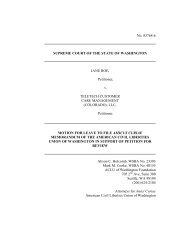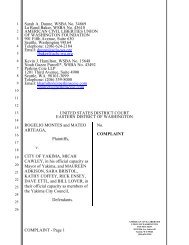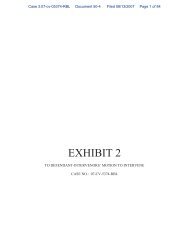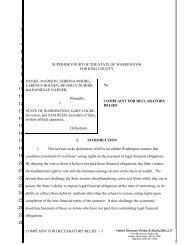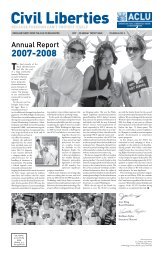BERGER v. CITY OF SEATTLE - ACLU of Washington
BERGER v. CITY OF SEATTLE - ACLU of Washington
BERGER v. CITY OF SEATTLE - ACLU of Washington
Create successful ePaper yourself
Turn your PDF publications into a flip-book with our unique Google optimized e-Paper software.
<strong>BERGER</strong> v. <strong>CITY</strong> <strong>OF</strong> <strong>SEATTLE</strong><br />
Freedman. “A licensing standard which gives an<br />
<strong>of</strong>ficial authority to censor the content <strong>of</strong> a speech<br />
differs toto coelo from one limited by its terms, or by<br />
nondiscriminatory practice, to considerations <strong>of</strong> public<br />
safety and the like.” Niemotko v. Maryland, 340<br />
U.S. 268, 282 (1951) (Frankfurter, J., concurring in<br />
result). “[T]he [permit] required is not the kind <strong>of</strong><br />
prepublication license deemed a denial <strong>of</strong> liberty<br />
since the time <strong>of</strong> John Milton but a ministerial,<br />
police routine for adjusting the rights <strong>of</strong> citizens so<br />
that the opportunity for effective freedom <strong>of</strong> speech<br />
may be preserved.” Poulos v. New Hampshire, 345<br />
U.S. 395, 403 (1953). Regulations <strong>of</strong> the use <strong>of</strong> a<br />
public forum that ensure the safety and convenience<br />
<strong>of</strong> the people are not “inconsistent with civil liberties<br />
but . . . [are] one <strong>of</strong> the means <strong>of</strong> safeguarding the<br />
good order upon which [civil liberties] ultimately<br />
depend.” Cox v. New Hampshire, 312 U.S. 569, 574<br />
(1941). Such a traditional exercise <strong>of</strong> authority does<br />
not raise the censorship concerns that prompted us to<br />
impose the extraordinary procedural safeguards on<br />
the film licensing process in Freedman.<br />
217<br />
Thomas, 534 U.S. at 322-23 (footnote and parallel citations<br />
omitted). The Thomas Court noted that constitutional concerns<br />
would arise if a permit requirement granted “unduly<br />
broad discretion in determining whether to grant or deny a<br />
permit,” and thus allowed the state to “favor or disfavor<br />
speech based on its content.” Id. at 323. But the statute in<br />
Thomas granted no such discretion, and the Court upheld it.<br />
[4] Guided by these precedents, we must decide whether<br />
Rule F.1 discriminates based on content. Berger argues that<br />
the rule does so because it “single[s] out persons who choose<br />
to exercise their First Amendment rights through the medium<br />
<strong>of</strong> performance arts.” The district court correctly rejected this<br />
argument. None <strong>of</strong> the challenged rules—the permit requirement,<br />
the bar on active solicitation, the designation <strong>of</strong> specific




